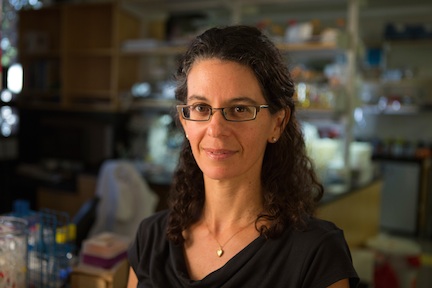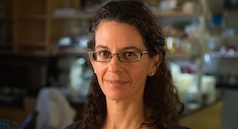
“Never underestimate the value of a broad, liberal education.
The fresh perspective that comes with breadth can stimulate
new ways of approaching a problem deeply.”
— Dianne K. Newman
By Aquene Kimmel
Phi Beta Kappa member and 2016 MacArthur fellow Dianne Newman investigates bacteria that produce energy in the absence of oxygen, a focus that has included work on iron deposits in ancient rocks to bacterial infections in modern-day patients.
Newman received the MacArthur “Genius” Grant for her work, which combines the fields of geobiology and molecular microbiology, greatly advancing both in the process. According to the MacArthur Foundation, the grants are awarded each year to about 20-30 individuals who meet three criteria: creativity, promise for future advancement based on their accomplishments, and potential to help others continue on from those advancements.
Newman became a member of Phi Beta Kappa when she graduated from Stanford University with a major in German Studies in 1993. Just four years later, she had earned her PhD at the Massachusetts Institute of Technology and was beginning a postdoctoral fellowship at Harvard Medical School. Since then, she has served as an Investigator for the Howard Hughes Medical Institute and as a faculty member at both MIT and the California Institute of Technology. She is currently the Gordon M. Binder/Amgen Professor of Biology and Geobiology at Caltech.
Newman’s research, conducted in the lab she leads at Caltech, began with mineral deposits in ancient rocks, as those are the main extant record of the Earth’s surface billions of years ago. From those, she and her team of researchers were able to determine how photosynthetic bacteria used ferrous iron as an electron donor billions of years ago, causing rust without oxygen.
“[Bacteria] are so much more interesting than we are,” Newman told the Los Angeles Times. “We basically have two ways of making energy. These guys have evolved ways to grow under every conceivable habitable condition.”
Newman has also studied how bacteria can cause dangerous levels of arsenic in drinking water by respiring arsenate from stones into arsenite, a more toxic form. Newman and her team isolated arsenic-respiring bacteria found on a wooden pier that had previously been treated with an arsenic preservative. They then used segments of the bacteria’s DNA injected into other bacteria to study their respiration process. Techniques that Newman developed during that inquiry are currently used to test contaminated water around the world.
From there, Newman’s research becomes even more closely related to human health. On the ancient, rusty rocks, not every bacterium had been directly touching the rock, so those which were further away used small molecules as electron shuttles, Newman explained to Forbes Magazine. Similarly, Newman found that P. aeruginosa, opportunistic bacteria that live in oxygen-lacking areas of the lungs of cystic fibrosis patients, also use shuttle molecules to respire. These bacteria are often antibiotic-resistant, so Newman’s research into their survival tactics could help in developing more effective treatments for them and for other bacterial infections.
Newman is not yet sure what she will do with the $625,000 that she will receive as a MacArthur fellow, but so far she has established one concrete goal and one that is more abstract: to endow Caltech’s Center for Environmental Microbial Interactions and to increase awareness of science as a meritocracy.
“In those five seconds [of fame], I hope to spread the word that it’s possible, regardless of your socioeconomic background, to become a scientist,” Newman told the Washington Post.
The MacArthur grant is only the most recent of Newman’s accomplishments. She has published over a hundred papers in journals such as Science, Geobiology, and the Proceedings of the National Academy of Sciences. In addition, she received this year’s National Academy of Sciences Award in Molecular Biology for launching the field of molecular geomicrobiology. In 2008 she received the American Society for Microbiology’s Eli Lilly and Company-Elenco Research Award while she was on maternity leave with her son.
As the MacArthur Foundation sums it up on their website: “Through her ability to bridge disparate disciplines and see the commonalities that underlie seemingly distinct processes, Newman is enriching our understanding of the impact of microorganisms from the early days of Earth’s history to human health today.”
Aquene Kimmel is a junior at Case Western Reserve University double majoring in English and French. Case Western Reserve is home to the Alpha of Ohio Chapter of Phi Beta Kappa, founded in 1847.




